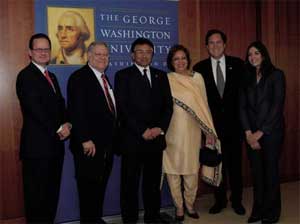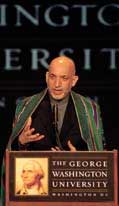|
October 2006
Presidential Views on Global Affairs
GW Welcomes to Campus Presidents Musharraf of Pakistan, Karzai of Afghanistan
  TOP: President of Pakistan Pervez Musharraf spoke about his country’s development at GW Sept. 22. Pictured from left to right are: Michael E. Brown, dean of GW’s Elliott School of International Affairs; President Stephen Joel Trachtenberg; Musharraf; First Lady Begum Sehba Musharraf; Karl Inderfurth, GW’s John
O. Rankin Professor of the Practice of International Affairs; and Jehan Riar, president of the GW Pakistani Students’ Association.
TOP: President of Pakistan Pervez Musharraf spoke about his country’s development at GW Sept. 22. Pictured from left to right are: Michael E. Brown, dean of GW’s Elliott School of International Affairs; President Stephen Joel Trachtenberg; Musharraf; First Lady Begum Sehba Musharraf; Karl Inderfurth, GW’s John
O. Rankin Professor of the Practice of International Affairs; and Jehan Riar, president of the GW Pakistani Students’ Association.
RIGHT: Hamid Karzai, president of Afghanistan, discussed the economic
viability of his country on Sept. 26 in GW's Media and Public Affairs Building. |
By Zak M. Salih
“Bismillah al-Rahman al-Rahim.”
Both Pervez Musharraf, president of Pakistan, and Hamid Karzai, president of Afghanistan, invoked the name of “Allah the merciful and beneficent” to open their remarks to GW audiences during their respective visits to the University in late September. Presidents Musharraf and Karzai, both leaders of Islamic republics and central players in the
U.S.-led war on terrorism, emphasized the crucial roles their countries play in the current global climate.
Musharraf spoke to a standing-room-only audience of students, faculty, and staff on Sept. 22 in GW’s Dorothy Betts Marvin Theatre. After initial remarks by his wife, Begum Sehba Musharraf, on the status of women in Pakistan, Musharraf outlined the ways in which he has transformed the country to the “modern, progressive society” he currently leads. He described the Pakistan he inherited in 2001 as a “rudderless ship on high seas in turbulent water” in which the only democracy was “a democracy of vendetta.”
Musharraf touted his administration’s economic and social reforms. “We have created an environment for
a sudden [economic] boom,” he said. “We may be slow
in certain areas, but we are moving. As long as…your direction is clear, your strategy is clear, you keep moving in that direction.”
Calling himself “the greatest believer in democracy,” Musharraf described his country as fully equipped to deal with the threat of terrorism. “We are on board with the free world to fight terrorism,” he said. “Pakistan is the only country…which understands terrorism from all its perspectives.”
Musharraf stressed a need for increased trust and coordination between the United States and Pakistan. “I’m a soldier. I fought wars,” he said. “The first sign of defeat in a force is when there is bickering between the force.”
International relationships also were key to Karzai’s Sept. 26 speech in the GW Media and Public Affairs Building’s Jack Morton Auditorium. Karzai, whose speech preceded a discussion by a panel of experts on Afghan-U.S. commerce, focused on his nation’s economic challenges
and opportunities.
“Afghanistan is a business place,” he said. “It
is not a place for politics.” Karzai was introduced by U.S. Secretary of Commerce Carlos Gutierrez, who called the president “an ally and
a friend.”
Stressing his commitment to a strong market economy that includes the export of rugs, marble, fruits, and nuts, Karzai drew parallels between the country’s prime location and resources and the ancient trade routes of the Silk Road. “Afghanistan is at the crossroads [of business],” he said. “If you want to go to any country, you have to go through Afghanistan.”
President Karzai assured the audience, which included members of the U.S. Department of Commerce and the Afghan-American Chamber of Commerce, that despite the continued security threats, it is safe to embark on business in Afghanistan.
Karzai also expressed his hopes for improving economic relations to create new jobs, perpetuate prosperity, and ensure the long-term survival of democracy.
“We will never be rich by the donations and the help the rest of the world gives us,” he said. “For Afghanistan
to grow, it needs to be in business.” According to Karzai, prosperity in Afghanistan will spur prosperity in Asia and, by extension, the world.
Both presidents visited GW as part of respective trips to the United States, where they met with President Bush and addressed the United Nations General Assembly.
Send feedback to: bygeorge@gwu.edu
|
|

|

